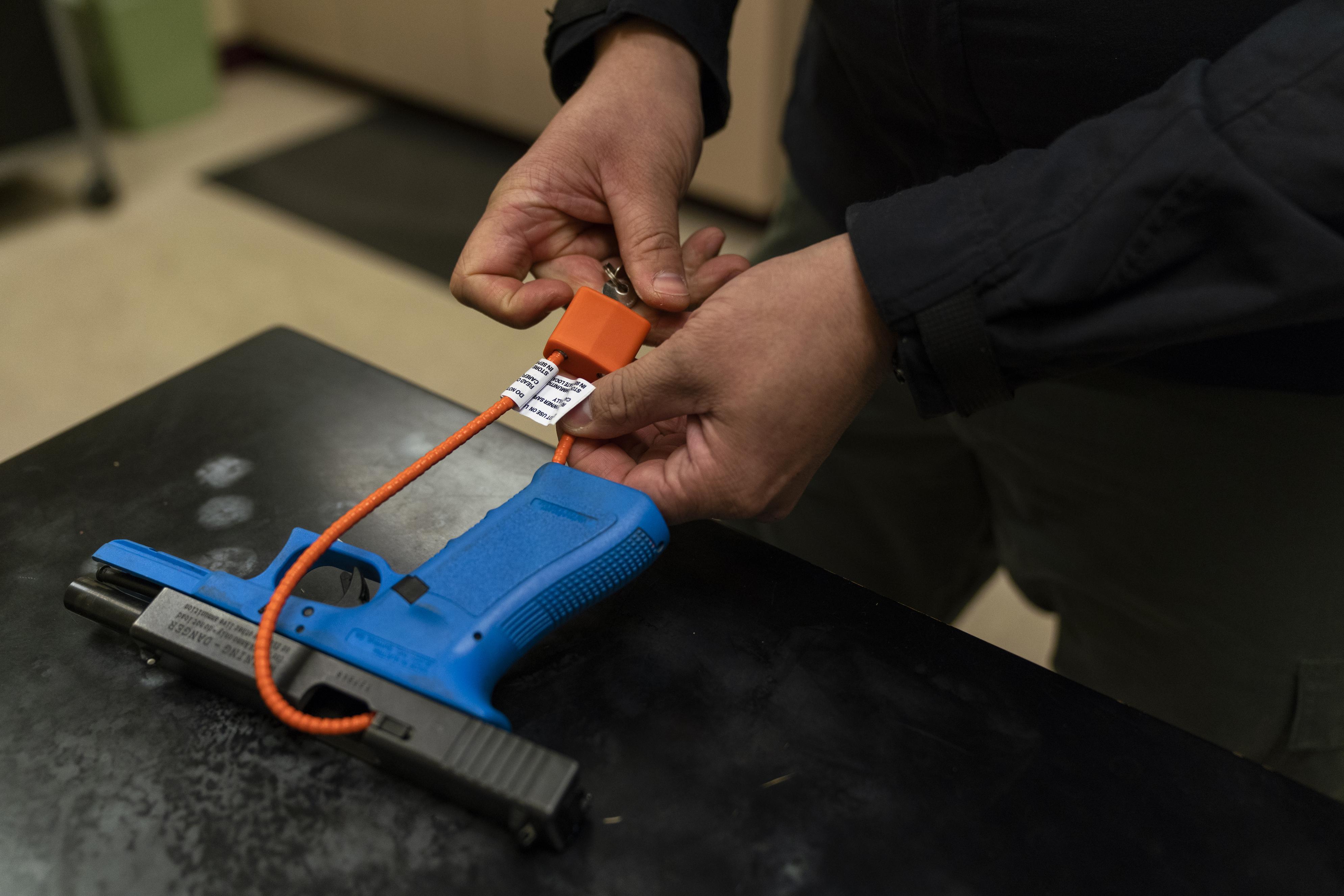
Sgt. Brandon White of the Multnomah County Sheriff's Office puts a cable lock on a training Glock on Jan. 14, 2019 in Portland, Oregon.
Jonathan Levinson / OPB
After three years of lobbying from gun safety organizations and multiple stalled attempts, Oregon lawmakers passed a firearm storage law Thursday. If the legislation is signed into law, Oregon will join 11 other states with laws requiring locking devices on stored firearms.
The bill passed Thursday in the House, Senate Bill 554, also includes language banning firearms from the state Capitol, and allowing public school districts, universities, and community colleges to enact similar bans.
The bill passed 34-24, after a lengthy and sometimes emotional debate. Three Democrats voted in opposition: Reps. Mark Meek, David Gomberg and Paul Evans. It must now be sent back to the Senate, which passed an earlier version. No Republicans supported the bill.
“This is about good policy that supports gun owners and non-gun owners alike,” said state Rep. Rachel Prusak, D-West Linn, a chief supporter.
The components of SB 554 were initially contained in separate pieces of legislation, but were combined and watered down to help overcome strong opposition to gun laws in the state.
The ban on firearms in the Capitol originally included all state buildings and would have allowed local governments to pass their own bans if they wished to do so. The new version limits the ban to the statehouse and removes the ability of local governments like counties and cities to set their own restrictions.
The provision allowing local education institutions was backed by leading school advocates in Oregon.
Rep. Andrea Valderrama, who also chairs the school board for the David Douglas School District, voted yes on SB554. She said the board has not discussed a firearms ban yet, but with House passage of the bill, she plans to bring it to the board for consideration and “will be urging my colleagues to support.”
The Oregon School Boards Association and Oregon Education Association, two groups representing school district governing boards and the state’s unionized teaching force, respectively, shared testimony in support for the bill as it moved through the legislature. In its testimony, OSBA called the bill a “tool” school districts can use.
”School districts should be able to consider and balance these rights in a public process against student rights to access education freely and without fear,” wrote OSBA legislatives services specialist Richard Donovan in the Feb. 22 message.
Concealed handgun license holders, who are currently allowed to bring guns into public buildings, would face a Class A misdemeanor for violating a ban. That’s less severe than the Class C felony in the original bill. Gun owners with a CHL would also face a misdemeanor for possessing a gun in the terminal of Portland International Airport, though an exemption exists for guns in checked luggage.
People without a CHL are already subject to a Class C felony for bringing guns into public buildings.
The safe storage portion of the bill requires gun owners to report a stolen firearm within 72 hours of noticing it’s missing. Unlike some states with stiff penalties and fines for violating safe storage and firearm access laws, the bill passed Thursday takes a softer approach.
Failing to secure a firearm would result in a maximum fine of $500. That fine quadruples to $2,000 if a minor accesses an unsecured firearm.

State Sen. Floyd Prozanski, D-South Lane and North Douglas counties, greets a member of the public at the conclusion of the Oregon Senate Judiciary Committee's hearing on Senate Bill 978 the Oregon Capitol in Salem on April 2, 2019. An opponent of the gun control bill shares his thoughts with the head of the committee after it adjourns.
Bryan M. Vance / OPB
Firearm suicides in Oregon far outpace the national average. In 2016, 82% of Oregon’s 503 firearm deaths were death by suicide. That’s compared to 59% nationally.
During public testimony for the bill in March, sponsor state Rep. Janeen Sollman, D-Hillsboro, said the primary aim of this bill is to improve those numbers.
“The goal is to reduce access to firearms from people, especially, children, teens and young adults, who would use it to harm themselves,” Sollman said during public testimony. “Suicide by firearm is happening across Oregon. It does not discriminate.”
In her testimony, Sollman responded to concerns from rural constituents who said they depend on their firearm for safety in areas where law enforcement often have long response times.
“If a gun owner is home alone, or home with their partner, they are in control of their firearm and do not have to keep it locked,” she said. “If they have guests over or if there are kids in the home, then they need to make sure their firearm is secured.”
The bill passed by the House Thursday also allows gun owners to be sued if their lost or stolen firearm is used to commit a crime, but altered the liability standard from the initial bill, making it a little harder to win damages in a claim.
Republican lawmakers strenuously opposed the bill, arguing it would needlessly penalize gun owners who are law abiding citizens and who could be a last line of defense against mass shootings. They further worried that the bill will impede gun owners’ ability to defend themselves and could lead to unfair litigation if a gun is stolen and used in a crime.
Another common theme from Republicans: They’ve heard immense pushback to the bill in their districts.
“I’m receiving, overwhelmingly, phone calls and emails from constituents that just do not like this bill,” state Rep. Jack Zika, R-Redmond, said in a committee hearing Friday, suggesting he’s been pushed to stage a walkout over the matter. “Of course they’ve been asking me to go the nuclear option, but I haven’t decided to do that. It’s more of an attack on their rights.”
Zika wound up being excused from attending Thursday’s floor session, though the reason for his absence wasn’t clear.
Some Republican lawmakers firmly against the bill used their time during floor debate Thursday to push back against the very hardline “nuclear option” rhetoric Zika referenced.
“Some unscrupulous organizations have misled Oregonians into thinking that lobbying any Democrat is a waste of their time,” said House Minority Leader Rep. Christine Drazan, R-Canby. “That instead they should push the easy button, to call on me to deny quorum. They were told that instead of voting no, I have an obligation to leave right now before the final gavel drops.”
Drazan said representatives like her, who stayed to vote no against the bill, are not the enemy. She repudiated deceptive language used by activist groups. She said their information is misleading and “buys into the aggressive swarm mentality. Cancel culture with full abandon.”
Despite the opposition, safe storage laws have been shown to work at reducing some gun violence.
In 2018, a team of researchers at the RAND Corporation looked at how different kinds of gun laws impact homicides and suicides. The lead researcher on that study said they found that safe storage laws can reduce the number of lives lost to suicide and unintentional injury.
Previous attempts to pass similar legislation failed in 2019 after Gov. Kate Brown agreed to scuttle the bill for support on education funding.
OPB reporter Elizabeth Miller contributed to this story.

